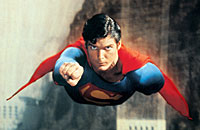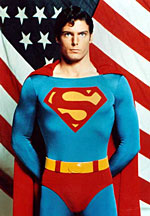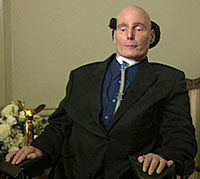>> Top Nine: Yusuf's Choice
>> Alphabetti Fumetti: S is for Shooter
More...

In comic books, no one ever stays dead. It's a consequence of having characters who never age, whose stories are in perpetual transition from month to month. Every now and then a company might decide to "kill off" a character to stimulate sales and shake up the status quo, but really, anyone who spends any amount of time reading comic books would have to be incredibly naïve to think that death is permanent in this four-colour world.
It was with great sadness that we learned about the death of Christopher Reeve last week; the man who was Superman. In fact, he was so closely identified with the character he portrayed in the movies, it's almost tempting to believe he isn't dead, and that any moment now he'll come back, swooping through the sky like a big blue comet.
 Alas, that's not going to happen, but we can still remember him by a series of mostly successful SUPERMAN movies, and his tenacious campaign for disability rights and stem cell research in the wake of a riding accident that left him quadriplegic. It's a comparison that the newspapers have never grown tired of making; that Reeve might have looked the perfect lantern-jawed hero on the big screen, but he became an even greater hero when faced with real tragedy and insurmountable odds. And they keep making that comparison because it's true.
Alas, that's not going to happen, but we can still remember him by a series of mostly successful SUPERMAN movies, and his tenacious campaign for disability rights and stem cell research in the wake of a riding accident that left him quadriplegic. It's a comparison that the newspapers have never grown tired of making; that Reeve might have looked the perfect lantern-jawed hero on the big screen, but he became an even greater hero when faced with real tragedy and insurmountable odds. And they keep making that comparison because it's true.
I absolutely loved the first two SUPERMAN movies when I was a kid, and can safely say that if I hadn't seen them both when I was so young, it's unlikely that I would've started reading comic books at all. They were such wonderful films, and featured a spectacular roster of talent both behind and in front of the camera; the direction of Richard Donner, the epic cinematography of Geoffrey Unsworth, a screenplay by Mario Puzo, a rousing score by John Williams, support from Marlon Brando, Margot Kidder and Gene Hackman; the list goes on and on. But all their hard work would have amounted to nothing if the right person hadn't been cast for the role of Superman, and in Christopher Reeve they got it absolutely right.
Yeah, the guy was six feet tall and had blue eyes, but he also knew how to act. His approach to the part was a difficult blend of humour and conviction. A little too much of either and the balance would have been tipped towards camp, or po-faced seriousness, neither of which does the superhero genre any favours, but Reeve achieved the balance with consummate ease. And judging by his audition reel for the part (available as an extra on the Superman DVD), it was an understanding of the character of Superman that he held from the very beginning.
His portrayal of Clark Kent was also note perfect. An investigative journalist and Superman's alter-ego, Clark Kent is practically a separate character in itself. Reeve played Kent as a clumsy fool in an ill-fitting suit, and watching those pratfalls in front of Lois Lane or Perry White in the newsroom of the Daily Planet, it's hard to believe that this is a Man of Steel who could level mountains with his bare hands. The comedy is perfectly timed, and it's a skill that Reeve never used enough of in his later film career. It is only in certain scenes where he stands up a little straighter or takes off his glasses, where Clark Kent's vulnerability is subsumed into Kal-El's self-assurance, that you realise Reeve is not playing one role, but two.
 Needless to say, the first film was an immense hit with audiences in 1978, and went on to spawn several sequels. Reeves became an icon of eighties America, and publicity shots of him in costume would regularly feature an American flag in the background. The success of the films also fed back into the comics, but in a positive way. There wasn't a flurry of new titles being released by DC to cash in, but rather a creative regeneration of the character and source of inspiration to writers and artists. The most obvious example is John Byrne's rebooting of the SUPERMAN comics in 1986, which borrowed heavily from the origin story laid down in the films.
Needless to say, the first film was an immense hit with audiences in 1978, and went on to spawn several sequels. Reeves became an icon of eighties America, and publicity shots of him in costume would regularly feature an American flag in the background. The success of the films also fed back into the comics, but in a positive way. There wasn't a flurry of new titles being released by DC to cash in, but rather a creative regeneration of the character and source of inspiration to writers and artists. The most obvious example is John Byrne's rebooting of the SUPERMAN comics in 1986, which borrowed heavily from the origin story laid down in the films.
Perhaps the reason why Byrne's run on the character is remembered so well is because his Superman bore such a striking resemblance to Reeve. The only point on which Byrne deviated is that he didn't make Clark Kent such a schmuck, which to some extent was a mistake; Superman's character is less well-rounded as a result.
A less obvious influence of the film could be felt in Frank Miller's interpretation of Superman in THE DARK KNIGHT RETURNS in 1986. Positing that Reeve's Superman was an icon of Ronald Reagan's America, Miller joined the two together in an uneasy alliance where the blue boy scout was used by a thinly disguised President Reagan as an instrument of state control. This provided the set-up for a legendary confrontation between Batman and Superman, a moment in comic-book history that has been the basis of their relationship ever since. These two characters have not progressed beyond Miller's characterisation of polar opposites, of Batman's anarchism and Superman's belief in truth, justice, and the American way.
SUPERMAN is still the benchmark by which all superhero movies are judged, and Christopher Reeve is still the greatest actor to have ever breathed life into a comic book character. Yet Reeve never felt burdened by being so closely identified with the last son of Krypton. Reeve was always proud of the association, once noting, "It's a nice image, and if I'm still remembered for it in twenty years' time you won't find me knocking it. It hasn't been the end of the road for my career. I've lived an adventurous life and there's still plenty of good other roles waiting to be played."
 In 1995, Reeve had a riding accident when he fell off his horse and severed his spinal cord. This accident was attributed to 'The Superman Curse', a long line of tragedies to have befallen those actors and actresses associated with the role of Superman. George Reeves, who played Superman in a TV show in the fifties, he committed suicide under mysterious circumstances. Richard Pryor, who co-starred in Superman III, developed multiple sclerosis, and Margot Kidder, Reeve's Lois Lane, had a nervous breakdown. In truth, it is immensely insulting to these individuals to group their misfortunes together under the umbrella of showbiz superstition. Their connection to Superman and the difficulties in their personal lives are pure coincidence, and should be regarded as such.
In 1995, Reeve had a riding accident when he fell off his horse and severed his spinal cord. This accident was attributed to 'The Superman Curse', a long line of tragedies to have befallen those actors and actresses associated with the role of Superman. George Reeves, who played Superman in a TV show in the fifties, he committed suicide under mysterious circumstances. Richard Pryor, who co-starred in Superman III, developed multiple sclerosis, and Margot Kidder, Reeve's Lois Lane, had a nervous breakdown. In truth, it is immensely insulting to these individuals to group their misfortunes together under the umbrella of showbiz superstition. Their connection to Superman and the difficulties in their personal lives are pure coincidence, and should be regarded as such.
Reeve's response to the accident was one of courage and determination. He vowed that he would walk again, undergoing intense physical therapy and scouring the medical establishment for a possible cure. From his wheelchair he berated politicians like George W Bush for blocking scientific progress in stem cell research, and he used his celebrity to raise funds for other people with similar conditions. Some doctors accused him of offering false hope to people with disabilities, saying that he should have accepted his condition and got on with his life, but Reeve began a movement that will benefit others long after he is gone.
And in the end, that's the mark of a true hero. Not someone who dons spandex and a cape, who flashes a smile to the adoring public. It's someone who triumphs against adversity through sheer force of will, and helps out a few people along the way.
Christopher Reeve managed to do both, and the number of sympathetic tributes generated by his death is a testament to his considerable achievements. He will be fondly remembered.

This article is Ideological Freeware. The author grants permission for its reproduction and redistribution by private individuals on condition that the author and source of the article are clearly shown, no charge is made, and the whole article is reproduced intact, including this notice.


